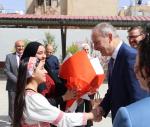You are here
‘Health for All’ forty years on
Oct 03,2018 - Last updated at Oct 03,2018
GENEVA — Forty years ago last month, thousands of delegates from 134 countries gathered in Kazakhstan, then a part of the former Soviet Union, to adopt the Declaration of Alma-Ata. This landmark agreement committed the world to expanding health access, and the principles it enshrined in a mere three pages continue to have a profound effect on the field of public health.
The declaration’s continuing appeal consists in its dual character: It is part gospel of applied science, part political manifesto. Among its key messages are increasing community leadership in health planning, reducing elitism in modern medicine and tackling social inequality for better health outcomes. The declaration’s central contribution was its articulation of “health for all”, a precursor to universal health coverage (UHC). Examining the origins and evolution of UHC’s founding doctrine could prove useful in the ongoing struggle to achieve it.
One of the biggest differences between 1978 and today is the breadth of health vulnerabilities. Climate change and shifting diets have created new risk categories, while wealth inequalities and political exclusion have produced deeper pockets of vulnerability. Consider, for example, the issue of migration: The politicisation of this age-old phenomenon has serious public-health consequences.
Health markets have also changed dramatically. Today, poorly regulated private healthcare sectors predominate in many countries in Asia, Latin America and Africa. While the expansion of healthcare markets expands patient choice, personal debt is also increasing. Moreover, commercial interests within the food, alcohol and tobacco industries undermine people’s health and complicate efforts to curb the rise in noncommunicable illnesses, like heart disease and diabetes.
Regrettably, community involvement in health planning has remained virtually unchanged since 1978. Although research shows that services improve when people participate in health planning, “participatory governance” is not a common feature in many developing countries. With few exceptions, Brazil and Thailand are often singled out, community-centred health systems remain rare.
The Declaration of Alma-Ata’s lasting legacy is the consensus that health can be improved only with a combination of good science, sound economics and action against social injustices. This was true in the 1970s, and it is true today. The international community should mark the declaration’s anniversary by recommitting to the values it upholds.
Three of Alma-Ata’s messages merit special attention. First, to improve health, leaders need to do more than build clinics and train physicians; they must also protect the environment, ensure access to clean water and sanitation, promote gender equality, create jobs and strengthen infrastructure. Although these objectives are incorporated in the UN Sustainable Development Goals (SDGs), there needs to be more serious commitment to the holistic approach advocated by the Declaration of Alma-Ata.
Second, more needs to be done to promote interdisciplinary health sciences that address both the practical and ethical questions posed by Alma Ata. One opportunity to reaffirm this principle will come this month, when some 2,000 stakeholders from around the world gather in Liverpool for the Fifth Global Symposium on Health Systems Research. Engaging government policymakers, civil society, the media and funders on the message of Health for All will be crucial to strengthening health systems.
Finally, just as the declaration prescribed, international health organisations and donors are beginning to reorient their strategies to empower leaders at the local and national levels. While there is still room for improvement, more women and citizens of developing countries occupy prominent positions in global organisations than before.
The world has yet to achieve the ideals announced in 1978. But we are moving in the right direction. True change takes place close to common people, and not just in centres of global power. It can come through more representative public institutions, more relevant science or more social action. In all of these areas, the Declaration of Alma-Ata will no doubt be a source of continued inspiration.
Kabir Sheikh is chair of Health Systems Global, a policy adviser at the Alliance for Health Policy & Systems Research, and former joint director for research and policy at the Public Health Foundation of India. Copyright: Project Syndicate, 2018. www.project-syndicate.org












